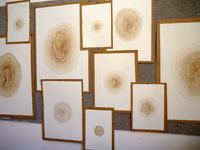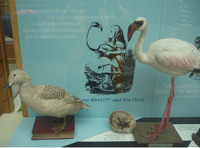Items
Site
The Medicine Chest
keywords is exactly
fact
-

The Hunting of the Snark
"The Hunting of the Snark offers a timely caution for geographical investigation. The danger, both academic and pragmatic, of enslavement to static conceptual categories, rigid classifications, and established methodological procedures is simply that they tend to rule out the possibility of experiencing that insight and understanding which can be neither discovered, formulated nor communicated by adherence to traditional investigative methdologies. This is not to advocate an un-methodical and irrational geographical philosophy, but rather to suggest that there may be conditions under which slavish adherence to a tried and tested methodology may fail to provide reliable guidance in our search for understanding. A lack of commitment to open-ended investigation could mean that, because our methods are inappropriate, our explorations will forever remain, so to speak, 'snarked' ". -

Ocean Chart
"He had bought a large map representing the sea, Without the least vestige of land: And the crew were much pleased when they found it to be A map they could all understand". -

Echolocation (Part two)
"In Steinbeck’s 'Of Mice and Men', Crooks consoles the simple, unaffected and kindly Lennie when his friend, George, doesn’t return from town. He tells him he should be glad that he at least has someone. 'S’pose you didn’t have nobody. S’pose you couldn’t get into the bunk-house and play rummy ‘cause you was black. How’d you like that? (…) A guy sits alone out here at night, maybe readin’ books or thinkin’ or stuff like that. Sometimes he gets thinkin’ an’ he got nothing to tell him what’s so an’ what ain’t so. Maybe if he sees somethin’, he don’t know whether it’s right or not. He can’t turn to some other guy and ast him if he sees it too. He can’t tell. He got nothing to measure by. I seen things out here. I wasn’t drunk. I don’t know if I was asleep. If some guy was with me, he could tell me I was asleep, an’ then it would be alright. But I jus’ don’t know' "(Steinbeck 1973:62 in Liebenberg 2011: 102). -

Forest (process)
A collection of Echinacea angustifolia tea rings read by botanist and dendrochronologist, Dr Edmund February. A molecule found in the Echinacea angustifolia plant prevents a caterpillar on eating it, from ever turning into a butterfly. Example of a specimen reading: “It would appear that the tree stood on a slope since there is more compression on the left hand side, which indicates that side was under less tension. It could also be a branch of which the left hand side would be its underside. The rings are uniformly wide which suggests plenty of soil and moisture availability. In comparison with the other two trees, the outer rings suggest less water or more competition.” -

Forest
A collection of Echinacea angustifolia tea rings read by botanist and dendrochronologist, Dr Edmund February. A molecule found in the Echinacea angustifolia plant prevents a caterpillar on eating it, from ever turning into a butterfly. Example of a specimen reading: “It would appear that the tree stood on a slope since there is more compression on the left hand side, which indicates that side was under less tension. It could also be a branch of which the left hand side would be its underside. The rings are uniformly wide which suggests plenty of soil and moisture availability. In comparison with the other two trees, the outer rings suggest less water or more competition.” -

Museum of Natural History Oxford
On a sunny afternoon, July 4th 1862, an Oxford don took out four friends, for a rowing expedition up the Thames. The don was the Oxford mathematician, photographer and storyteller, Charles Dodgeson (better known by his pen name, Lewis Carroll) and his friends were the Rev. Robinson Duckworth and three children – Alice Liddell, aged 10, and her sisters. During the afternoon Dodgeson spun out a series of fantastic yarns incorporating friends and familiar places in Oxford, mathematical riddles, literary allusions and countless references to natural history. -

The Swamp of Sadness
-

"I've decided to stop pitying myself"
“Her purse is half open, and I see a hotel room key, a metro ticket, and a hundred-franc note folded in four, like objects brought back by a space probe sent to earth to study how earthlings live, travel, and trade with one another. The sight leaves me pensive and confused. Does the cosmos contain keys for opening up my diving bell? A subway line with no terminus? A currency strong enough to buy my freedom back? We must keep looking. I'll be off now". An extract from Jean-Dominique Bauby's 'The Diving Bell and the Butterfly', the memoir which he dictated after suffering a stroke in 1995. The stroke rendered him mute and almost completely paralyzed, except for the movement of his left eyelid. Bauby dictated his memoir through blinking as his speech therapist listed the letters of the alphabet. When his doctor told him his prognosis, he mentioned that in the past , he would have simply died from this type of stroke, but that improved resuscitation techniques had now prolonged and refined the agony of this condition: "You survive, but you survive with what is so aptly known as 'locked-in syndrome'”. -

The Green Ray (Jules Verne)
"At last only a faint rim of gold skimmed the surface of the sea. 'The Green Ray! the Green Ray!' cried in one breath the brothers, Dame Bess and Partridge, whose eyes for one second had revelled in the incomparable tint of liquid jade. Oliver and Helena alone had missed the phenomenon which had at last appeared after so many fruitless observations. Just as the sun was shooting its last ray into space their eyes met, and all else was forgotten in that glance. But Helena had caught the black ray, shining from the young man's eyes, and Oliver the blue ray beaming from hers. The sun had gone down, and neither Oliver nor Helena had seen the Green Ray" (Verne 1883:136). -

Big Good Strong Hands...
The 1984 film, 'The Neverending Story', features Pyornkrachzark, the Rockbiter, a large creature made of stone. The Rockbiter species are named due to their diet of rocks and earth-based materials. The Rockbiter seen in the film particularly has a liking for limestone. In the novel and the first film, the Rockbiter appears early among the messengers sent to see the Childlike Empress at the Ivory Tower during the Nothing crisis. In the first film he ultimately reappears, encountered by Atreyu. He has lost faith in himself after failing to save his travelling companions from the Nothing, and advises Atreyu to flee.


